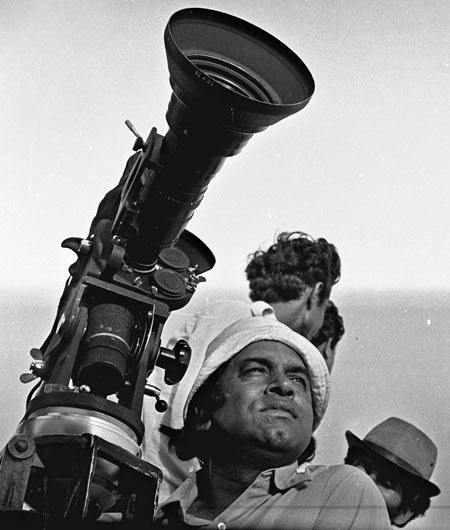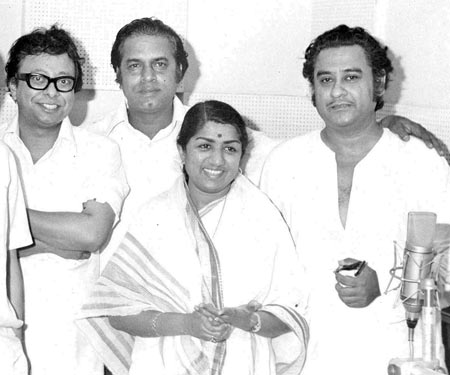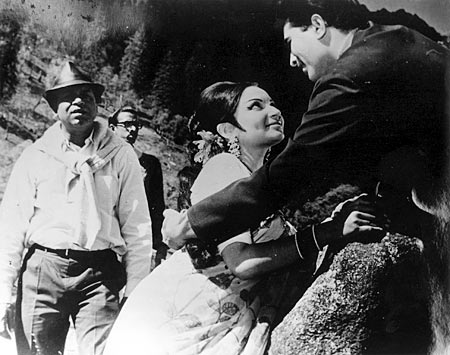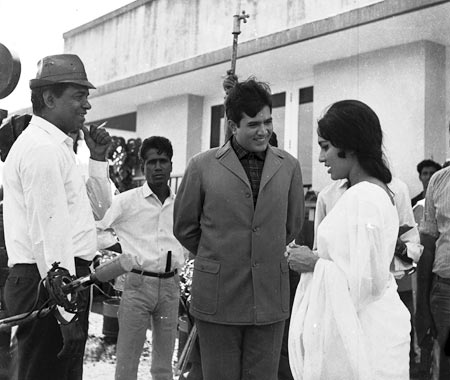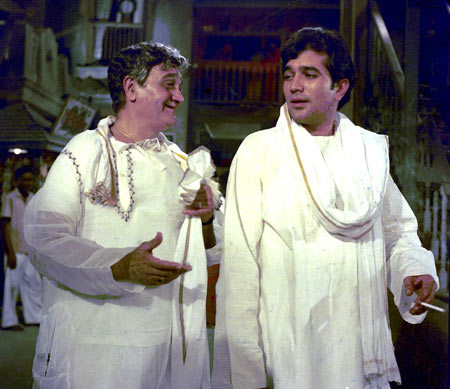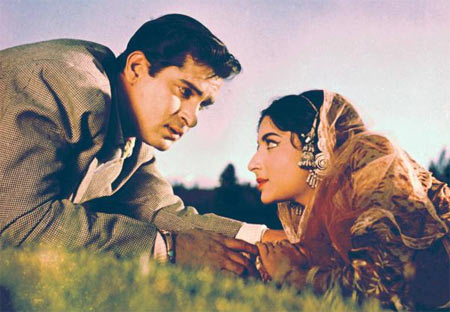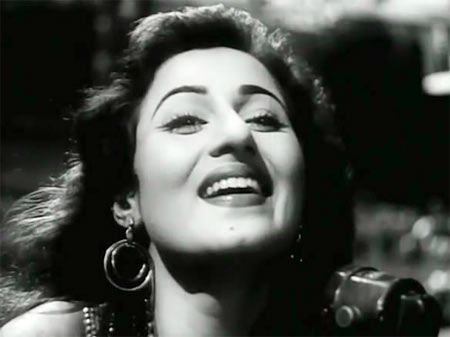This article was first published 13 years ago
Home »
Movies » How Aradhana, Kati Patang were made
How Aradhana, Kati Patang were made
Last updated on: June 26, 2012 18:12 IST
Image: Shakti Samanta
Legendary director Shakti Samanta's son Ashim takes Shaikh Ayaz through his best-loved movies, and shares some interesting behind-the-scenes nuggets.
In the 1960s and 1970s, Shakti Samanta was the undisputed showman.
Films like Aradhana, Amar Prem, Kati Patang, Kashmir Ki Kali and An Evening in Paris were not only blockbusters of their age but have also transcended their time to find resonance among viewers of different generations.
These films benefitted a great deal by the presence of its actors, Shammi Kapoor and Rajesh Khanna who remained well-known outside their era.
Samanta's films have also survived for two other reasons -- their theme of romance, a genre that can touch a chord with everyone and chartbuster music. "The more I look at dad's films, the more I am convinced that they are still fresh and haven't outdated at all," says Ashim Samanta, the legendary filmmaker's son.
There is a flurry of activity at their Andheri East office in Mumbai. Samanta's grandson, Aditya, is about to launched as an actor and there is excitement and anxiety in the air. It's been three years since Samanta passed away and Ashim can still sense his presence. "More than a father, he was a friend. We could feel for each other," he says.
He would have been pleased if his father was alive to see Aditya's film release. "Aditya has a big task ahead of him. He has to take forward the Samanta legacy," says the proud father, and slips down the memory lane to recount stories associated with some of Samanta's biggest blockbusters:
Image: R D Burman, Shakti Samanta, Lata Mangeshkar and Kishore Kumar
Samanta had a great ear for music. So it's no wonder that songs from his films are still a rage on the radio.
As a young boy, Ashim saw how devoted his father was when it came to music.
There would be music sittings at Samanta household and his father would find himself lost in rhythms and melodies. For the same reason, R D Burman, O P Nayyar and Anand Bakshi became his close friends.
"In fact, he used to create scenes just to incorporate music. He felt films are nothing without music."
An admirer of music director Pankaj Mullick and singer K L Saigal, Samanta's first dream was to become a singer. "He sang quite well," adds Ashim.
Image: Shakti Samanta, along with Sharmila Tagore, Rajesh Khanna in Aradhana
If it weren't for Gulshan Nanda, Aradhana -- among Samanta's signature works -- would have never been made," says Ashim. "Just a day before Aradhana was to start, Surinder Kapoor (producer and Anil Kapoor's father) invited dad to see his new film Ek Shriman Ek Shrimati starring Shashi Kapoor.
"Dad was shocked to see that the climax was the same as Aradhana's. It was possible because both films were written by the same writer -- Sachin Bhowmick. The next day, Samanta had made up his mind to scrap Aradhana."
It so happened that writers Gulshan Nanda and Madhusudan Kalelkar dropped into his office that day and they noticed that he was tense.
"Originally, Aradhana was to have Rajesh Khanna die at the interval point and a new hero would come in. Instead, Gulshan Nanda suggested why not have a double role of father and son. Dad loved the idea and went on to make the film."
Image: Shakti Samanta, Rajesh Khanna, Asha Parekh in Kati Patang
Another film was born that evening – Kati Patang.
"While dad was upset and had decided to move on from Aradhana, Gulshan Nanda told him not to fret and advised him to start another film. For that purpose, he narrated the story of Kati Patang.
"Dad jumped at it. First, they reworked the second half of Aradhana in the next few hours and then, they discussed Kati Patang at length. Two of his finest films were created in that evening, within a gap of few hours," says Ashim.
Commercially, Aradhana and Kati Patang did exceptionally well, featuring Rajesh Khanna at his romantic best with a soundtrack that remains at the very core of why we love those two films.
Image: Rajesh Khanna and Om Prakash in Amar Prem
Generally agreed to be his tour de force, Amar Prem was Samanta's personal favourite. Ashim says his father had seen the original, Nishipadma in Bengali, and was so impressed with Uttam Kumar's performance that he decided to remake it.
"Dad made quite a few changes in the new script but he wanted it to be Rajesh Khanna's best performance yet."
That's precisely what happened.
The line, 'Pushpa, I hate tears, re' uttered by Khanna in his trademark style has become one of Hindi cinema's most memorable screen moments. "That line was there in the original. We merely used it as a piece of dialogue. We had no idea it would become so iconic."
Image: Shammi Kapoor and Sharmila Tagore in Kashmir Ki Kali
Samanta was a close friend of Shammi Kapoor and gave him some timeless romantic films, among which Kashmir Ki Kali stands out. At the time of its shooting, it was raining heavily in Kashmir and they couldn't shoot for 21 days.
"When the rain stopped, there was suddenly sunlight and it didn't rain for the next 25 days or so and dad finally finished the Kashmir schedule.
"Kashmir Ki Kali features great music by O P Nayyar. Shankar-Jaikishan were the original choice, recommended by Shammi himself.
"When Nayyar called my father to hear some tunes, he couldn't refuse. In the course of their session, Nayyar played 30-40 tunes and dad was quite excited to use it all," says Ashim.
Finally, he selected some 12 songs, the leftover of which were used in Sawan Ki Ghata.
Image: Madhubala in Howrah Bridge
Samanta was keen on Madhubala for Howrah Bridge but he didn't know her personally. So, he told Ashok Kumar to put in a word. Samanta went to meet her with Rs 20,000 as a signing amount (she used to charge Rs 75,000 those days).
"Dad started the narration with her character, that of a Christian girl who speaks like, 'Humko tumse pyaar maangta hai.' When Madhubala heard that, she burst out laughing and agreed to do the film without actually hearing the story."
She even refused to accept any payment before the film's shooting. "She asked dad for one rupee as a signing amount and said the rest he can pay after the film is complete."
